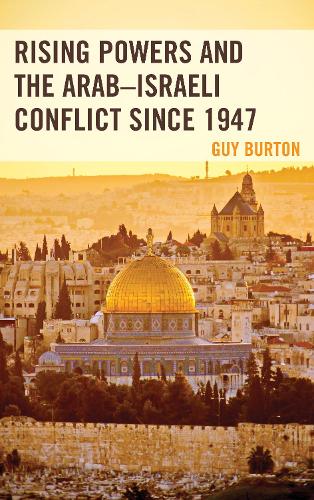
Rising Powers and the ArabIsraeli Conflict since 1947
(Hardback)
Available Formats
Publishing Details
Rising Powers and the ArabIsraeli Conflict since 1947
By (Author) Guy Burton
Bloomsbury Publishing PLC
Lexington Books
26th February 2018
United States
Classifications
Professional and Scholarly
Non Fiction
Middle Eastern history
956.04
Physical Properties
Hardback
206
Width 157mm, Height 240mm, Spine 22mm
499g
Description
What has been the role of rising powers in the ArabIsraeli conflict What does this tell us about rising powers and conflict management as well as rising powers behavior in the world more generally This book studies the way that five rising powersBrazil, Russia, India, China and South Africa, the BRICS countrieshave approached the conflict since it first became internationalized in 1947. Conflict management consists of different methods, from peacekeeping to mediation and the use of economic incentives and sanctions and (non)enforcement of international legal decisions. What distinguishes them is whether they are active or passive: active measures seek to transform a conflict and resolve it; passive measures seek to ameliorate its worst effects, but do not change their underlying causes. Since 1947 rising powers active or passive use of these methods has coincided with their rise and fall and rise again in the international system. Those rises and falls are tied to global changes, including the Cold War, the emergence of the Third World, economic and ideological retrenchment of the 1980s and 1990s and the shift from unipolarity to multipolarity after 2000. In summary, rising powers management of the ArabIsraeli conflict has shifted from active to more passive methods since 1947. Their actions have occurred alongside two key changes within the conflict. One is the shift from a primarily state-based conflict between Israel and the Arabs to one that is more ethnic and territorial in scope, between Israel and the Palestinians. The other the emergence of the Oslo framework which has frozen power imbalance between Israel and the Palestinians since 1993. By pursuing the Oslo process, rising powers have separated conflict management from developing normal diplomatic and economic exchanges with Israel and the Palestinians. In adopting this more passive conflict management approach, rising powers are disregarding both emerging alternatives that may potentially transform the conflicts dynamics (including involvement with civil society actors like the Boycott, Divestment and Sanctions movement) and undertaking more active efforts at conflict resolutionand presenting themselves as global powers.
Reviews
Guy Burtons book is a highly timely and readable account of the rising powers policies vis--vis the Arab-Israeli conflict. The emergence of regional powers in the post-Cold War global setting has spurred an increasing volume of literature on their Middle Eastern policies. The author situates his work within this trend. His contribution is thus threefold: Burton puts together an assemblage of these states policies in one volume, which is a first. He addresses one of the conflicts literatures key disadvantages, which is the predominance of the great and super power vantage point. And by detailing both the contributions and shortcomings of the BRICS policies, the book serves as an innuendo on the BRICS potential to help resolve the worlds most intractable conflict and perhaps other conflicts too. * Centre for Mediterranean, Middle East & Islamic Studies *
This fascinating study takes the discussion of the Arab-Israeli conflict to a whole new level, constructing for the first time a picture of how the BRICS as a group of rising powers responded to the conflict, viewed the regional and international tensions arising from the conflict in the Middle East, and explored issues of conflict management. Looking back, the USSR was a superpower at the height of the A-I conflict and the BICS were barely emerging powers. Nevertheless, the reconceptualization of the conflict from the 1940s to the 2000s through a BRICS eyepiece presents us with most interesting insights. Lets call Guy Burtons new book a real eye opener. -- Anoush Ehteshami, Durham University
Ignore them at your peril. That is the message of this excellent study of the increasing and changing role of rising powers in international conflicts. That changing role is nowhere more evident than in this look at how rising powers have dealt and deal with the ArabIsraeli conflict. It provides valuable insights in a world of shifting power balances. -- James M. Dorsey, S. Rajaratnam School of International Studies
Guy Burton presents a captivating account of how rising powers have influenced the Arab-Israeli conflict throughout the second half of the twentieth century. Contrary to prevalent explanations of the conflict focusing on the role of great powers and regional actors involved in the conflict, this book offers a fresh reading of the dynamics of a protracted conflict lying at the intersection of regional and international politics. Whereas rising powers are often perceived as spoilers to the international system, Burton argues that rising powers engage in conflict management as a means to advance their status and legitimacy in the international system. -- May Darwich, Durham University
Author Bio
Guy Burton is assistant professor of public policy at the Mohammed Bin Rashid School of Government in Dubai.
